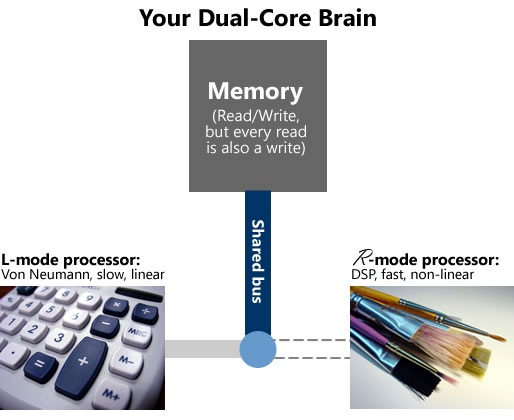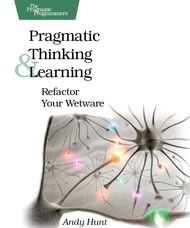This article also appears in Canadian Developer Connection.
It’s easy to point to books on understanding and improving the inner workings of your code, the software and hardware platforms on which it runs and even the processes used in developing it. It’s much harder to find one on understanding and improving the programmer, or more specifically the programmer’s “wetware” – that is, the brain and mind. A few books aimed at programmers give a little space to the topic: Tog on Interface has a section and exercise on building your intuition, the first edition of Code Complete devotes a small chapter to character, and Cocoa Programming for Mac OS X reminds the reader that getting extra sleep when learning new material is essential. For a whole book on the topic, we’ve had to wait until Andy “The Pragmatic Progammer” Hunt’s Pragmatic Thinking & Learning: Refactor Your Wetware.
The first few chapters of PT&L form a quick introduction to the theories of cognition, learning and neuroscience on which the rest of the book is based. Among these are the Dreyfus Model, which explains how we progress from novice to expert and the steps along the way and a model of the brain in techie terms, shown below:

Once PT&L has laid out these foundations, it dives into the brain-refactoring, including:
- Taking advantage of R-mode (often called the “right brain” in pop psychology), which often gets ignored because of its non-linear, non-linguistic, unpredictable and even “artsy” nature. It’s actually an amazing problem-solver, so much that PT&L suggests that you should “lead with R-mode and follow with L-mode”, or more colloquially, “write drunk; revise sober”.
- Working around the bugs in your brain. And there are many, from the primitive “lizard brain” that likes to override our higher cognitive functions to cognitive biases to generational affinity.
- Learning deliberately: what learning is and isn’t, how to plan to learn, figuring out what your learning style is and how to best take advantage of it, and harnessing mind maps, documentation and teaching in order to learn.
- Gaining experience, which includes understanding the importance of fun and how pressure kills cognition, learning the “inner game” and why your mantra shouldn’t be “learn to build”, but “build to learn”.
- Managing focus, a very important topic since there are so many things vying for it, from office interruptions to the siren song of the internet, with email, IM, Twitter, Digg, Reddit and LOLcats. One of my favourite bits in this section was some research whose results indicated that constantly checking your email lowers your effective IQ more than smoking a joint.
PT&L does a great job following its own advice by presenting its material in ways that best take advantage of how our brains work, reinforcing its with anecdotes, metaphors and visuals and using the enjoyable style for which Andy Hunt’s other projects, such as The Pragmatic Programmer and his various training sessions have become famous.
As with any book that proscribes a new way of doing or perceiving things – think of books on Agile programming or “Getting Things Done” methodologies – you’ll have to pick and choose which ideas and techniques work best for you. In his review, O’Reilly editor Nat Torkington found the section on generational affinity a little too “Malcolm Gladwell”-ish in the way that it treats anecdotes about generations as data (personally, I think there’s some truth to the generational affinity thing). I do agree with Nat that some of the exercises, such as “Morning Pages” that seem a bit too new-agey/hippie even for me – and I’m the kind of guy who’d go to Burning Man.
This is the only book of which I’m aware that covers how to improve the tool that really develops code: not your platform, language or editor, but your mind. It’s worthy of several readings, first straight through and subsequent dives into specific sections. I took it with me on my flight from Toronto to TechDays Calgary and found it both not only informative, but engaging and entertaining as well. Best of all, barring some quantum leap in cognitive science that invalidates what we know today, PT&L will probably have a much longer shelf life than most of the tech books in your library.
It’s my favourite geek book of 2008.
Pragmatic Thinking & Learning is available in both dead-tree (US$34.95 direct from the publisher, CAD$30.69 from Chapters/Indigo online) and PDF formats (US$22.00). It’s a finalist in the “Books General” category of the 19th Annual Jolt Awards.
Would you be interested in hearing more from PT&L’s author, Andy Hunt, himself? Let me know either via email or the comments, and I’ll see what I can do about arranging an interview in some format with your questions!
